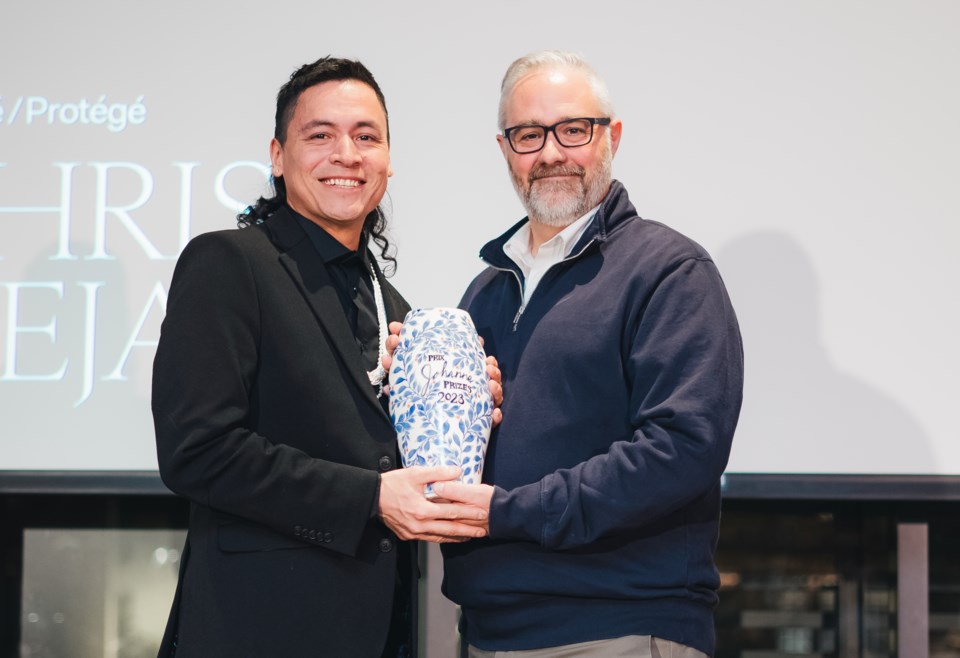In case you missed it. This article was previously published on StratfordToday.
It could have been recognition for a successful career in the arts, meeting some of his esteemed peers and learning more about their work, or a financial prize that is among the largest for artists in the province.
Instead, the best part of a whirlwind evening for Keith Barker, one of five recipients of the prestigious Johanna Metcalf Performing Arts Prizes, was getting a chance to introduce arts industry movers and shakers to his friend and "protégé", Chris Mejaki, at a ceremony at the Gardiner Museum in Toronto.
Barker, Director of New Plays at the Stratford Festival, enjoyed sharing the stage with his Stratford Festival colleague and friend.
"The most exciting thing was being able to pick Chris, an actor and playwright, and support him and his trajectory as an emerging artist.
"That was part of the magic of the night."
The awards are named in honour of the late Johanna Metcalf, who owned a home near the Stratford Festival and was a well-known supporter and lover of the arts. Five winners received a $25,000 prize. That list was shortened from 15 finalists.
In addition, nominees selected a protégé, with winners getting $10,000, "as a way of celebrating early career artists who are showing formidable promise".
Mejaki, an Indigenous artist, performed in Richard II and Love's Labours Lost this past season at the Stratford Festival and will be part of the acting company again in 2024.
On the night of the awards, protégés introduced the winners and spoke about work and connections to the recipient.
"Then I got to go up there and speak about why I chose Chris. How much I love him. How he is a fantastic artist."
Nominees for the awards were selected by their peers in partnership with Ontario Arts Council (OAC) through over 20 juried OAC competitions in dance, music/opera, and theatre, as well as competitions focused on Francophone, Indigenous, and Northern communities. Artists producing and showing work over a period of at least 10 years were eligible.
Barker has worked his way up the theatre ladder, so to speak, as an actor, playwright and an arts administrator. He was the artistic director at Native Earth Performing Arts, Canada's oldest professional Indigenous theatre company, for five years, before accepting his senior role at the Stratford Festival.
He keeps his acting chops refined, having played Louis Riel in Women of the Fur Trade, on stage in Stratford this past season.
His current position at the Stratford Festival has him "sitting about 20 feet away" from Artistic Director Antoni Cimolino.
Productions such as A Wrinkle in Time and Women of the Fur Trade have fallen under new play development. Next season, Get that Hope and Salesman in China are two productions that the department has shepherded through.
"There is a lot of conversation around what hits our stage, and it comes through our department."
Barker and his team seed and commission work, always working ahead to the next year of performances and beyond.
"We have to plant that seed early and work with the artists to get the work ready for the stage."
Increasingly, performances are more diverse and include perspectives from a variety of vantage points.
"That is the exciting thing and one of the reasons I was excited about this job. There are so many communities that have excellent writers and artists that tell a uniquely Canadian story that hasn't necessarily been on our stage. All those different voices and all those different artists."
"So many artists that we are engaged with that are trying to commission to write plays, that are from the IBPOC communities...we are just looking for great playwrights and great storytellers and the great thing for me is they are coming from communities and telling stories that are unique to their own lived experience."
Ultimately, the stories being told on stage at the Stratford Festival are appealing to more people, he said.
"Sometimes people say, 'I can't relate to that'. But they are human stories. We can relate to anything when it is a great storyteller, it crosses the divide of the person you don't know across from you.
"I feel like the more people see themselves on stage, the more they are going to want to come to Stratford. Which means new communities coming and experiencing the magic of the Stratford Festival. That is my job now."


